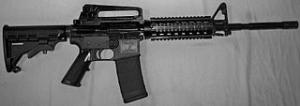GunsIt’s time to repeal the gun industry’s exceptional legal immunity
Coming up with effective and realistic solutions to curb gun violence is not easy. Guns pose a tricky dilemma, because they can be used to do good or bad things. They can be used to commit heinous crimes, but they can be used to protect lives as well. The challenge for lawmakers is to come up with ways to reduce the risk of criminal misuse of guns while preserving and even promoting the likelihood of guns being used in beneficial ways. Ensuring that every firearm manufacturer and dealer operates as safely and responsibly as possible should be one piece of the puzzle. A key way to ensure that gun companies have the right incentives would be to repeal the Protection of Lawful Commerce in Arms Act. Enacted in 2005, this federal law gave gun sellers a special immunity from legal responsibilities, which is not enjoyed by any other industry. Gun manufacturers and dealers should not be subject to any extraordinary forms of liability that do not apply to other products. They should not be liable, for example, merely because a firearm is a weapon that is capable of being used to do harm. But if a gun manufacturer or dealer fails to take basic, reasonable precautions in distributing products, it should be held accountable under the law just as an irresponsible company in any other business would be. With the risks of firearms in the wrong hands becoming ever more apparent, Congress should reconsider its regrettable decision to give the gun industry special immunity from legal responsibility.

M-4, a shorter, carbine version of the M-16 // Source: commons.wikimedia.org
Gun violence has been a problem for a long time, but the recent shootings in Paris and San Bernardino have focused new attention on the issue.
Americans no longer just worry about someone shooting up a school or workplace for personal reasons. The threat of terrorism has added an alarming new dimension to the problem.
Coming up with effective and realistic solutions is not easy. Guns pose a tricky dilemma, because they can be used to do good or bad things. They can be used to commit heinous crimes, but they can be used to protect lives as well.
The challenge for lawmakers is to come up with ways to reduce the risk of criminal misuse of guns while preserving and even promoting the likelihood of guns being used in beneficial ways.
Ensuring that every firearm manufacturer and dealer operates as safely and responsibly as possible should be one piece of the puzzle.
A key way to ensure that gun companies have the right incentives would be to repeal the Protection of Lawful Commerce in Arms Act.
Gunmakers’ special immunity
Enacted in 2005, this federal law gave gun sellers a special immunity from legal responsibilities, which is not enjoyed by any other industry.
This law was enacted because a wave of lawsuits had put unprecedented pressure on the gun industry. In 1998, New Orleans became the first city to file a lawsuit against gun manufacturers. More than thirty other major American cities and counties soon followed. Other cases brought by individual victims of shootings began working their way through the courts as well.
As one of the lawyers at the Brady Center to Prevent Gun Violence helping to bring these cases, I saw very clearly the impact that they had. The lawsuits generated evidence of severe problems with distribution of guns, including undercover sting operations revealing how gun dealers knowingly allow people to make “straw purchases” on behalf of convicted felons who cannot pass a background check.
The lawsuits also changed perceptions about the issue. Rather than seeing gun violence simply as a crime issue, the press and public began focusing for the first time on specific ways in which the gun industry’s practices contribute to the danger.
